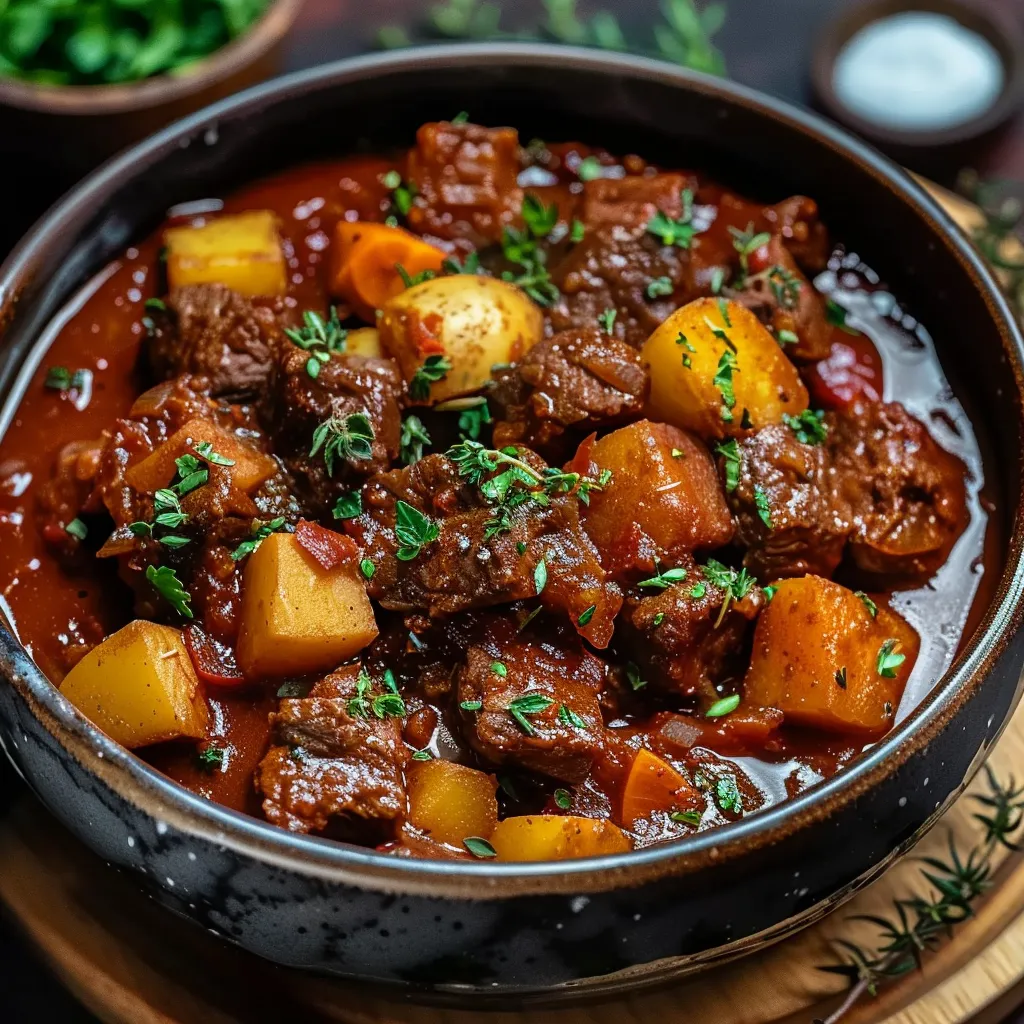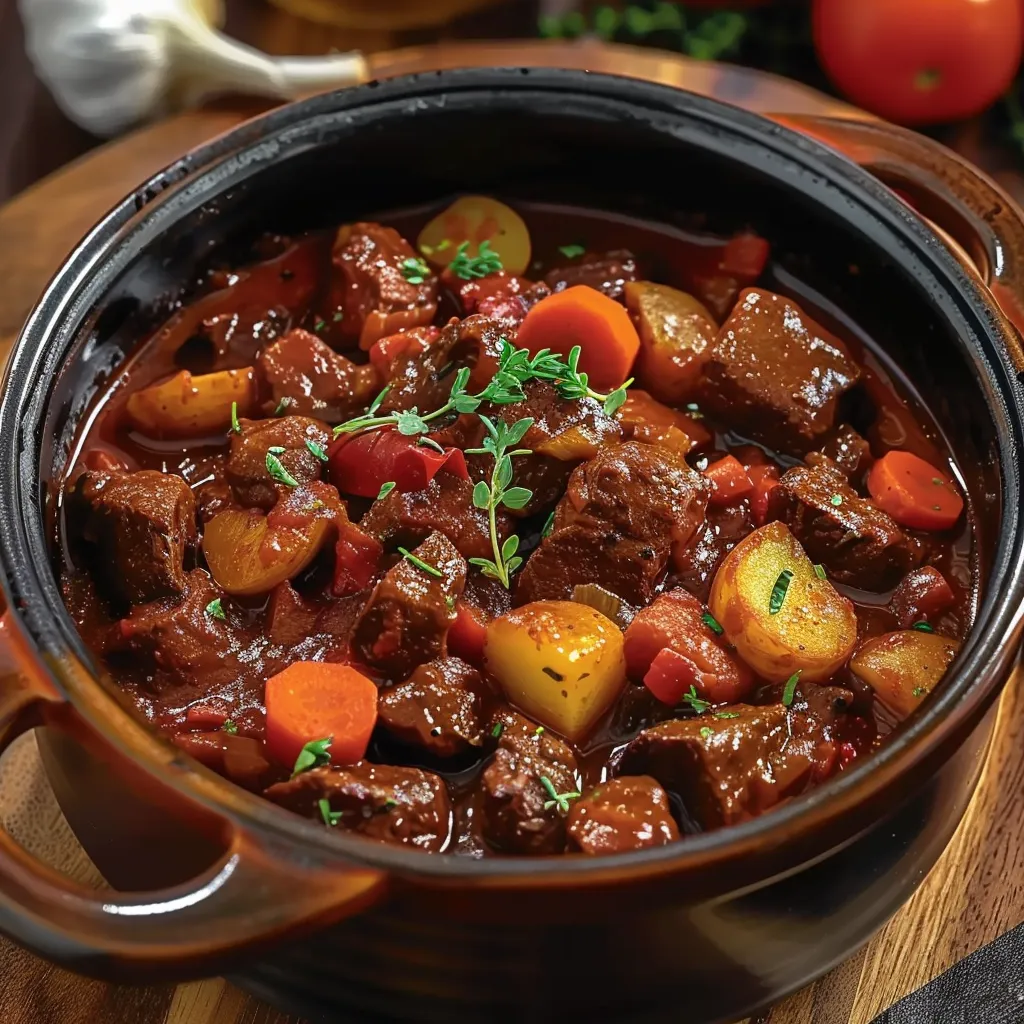 Pin it
Pin it
This heart-comforting Hungarian goulash has been my gateway to Eastern European cooking for years. The deep paprika-soaked broth paired with fork-tender beef makes a soothing stew that turns regular weeknight meals into memorable gatherings.
I got this recipe from my neighbor Mrs. Kovács who came from Hungary. She always said true goulash needs time and honoring tradition. Her cooking changed my husband from doubting paprika to asking for this meal every week when it's cold outside.
Ingredients
- Vegetable oil or lard: Lard gives you that old-world flavor, but regular veggie oil makes a perfectly fine lighter option
- Large onions: They build your flavor foundation, so grab ones that feel heavy with no mushy parts
- Beef chuck or brisket: These cheaper cuts have great fat streaks that make them super soft after slow cooking
- Hungarian sweet paprika: This is what makes or breaks your goulash, so don't skimp - get good quality Hungarian stuff
- Beef broth: Makes everything taste meatier, though plain water can work too
- Potatoes: Yukon Golds or other waxy types won't fall apart in your stew
- Carrots: They bring a bit of sweetness and pretty color, pick firm bright ones
- Tomatoes: Fresh ones add a nice zip, but you can use tomato paste during colder months
- Garlic: Gives that background punch, always go with fresh cloves instead of the jarred stuff
- Bay leaves: These little leaves pack a subtle flavor that ties everything together
Step-by-Step Instructions
- Prep Your Ingredients:
- Cut your onions the same size so they cook evenly. Chop beef into 1-inch chunks that are all about the same size. Get your potatoes peeled and cut into similar-sized pieces so they finish cooking together.
- Build the Flavor Base:
- Warm up oil in a big Dutch oven on medium until it's hot but not smoking. Toss in onions and cook them for 8-10 minutes until they're nice and golden. This browning step brings out all the good flavors. Add your beef pieces with space between them. Work in batches if your pot isn't big enough. Brown them for about 2 minutes each side until they've got a nice dark crust. This browning makes everything taste better.
- Add the Paprika and Broth:
- Take the pot off the heat for a second to mix in paprika without burning it. Stir really well to cover all the meat. Right away, pour in a little broth and scrape the bottom with a wooden spoon. This pulls up all those tasty brown bits stuck to the pot.
- Simmer and Add Vegetables:
- Add the rest of your broth and let it come to a gentle boil. Turn down the heat to keep it at a low simmer. Put in potatoes, carrots, tomatoes, garlic, bay leaves, salt, and pepper. Make sure everything's covered by the liquid. Add bell pepper now if you're using it.
- Cook Until Tender:
- Put the lid on and let it bubble gently for about 1.5 to 2 hours. Check it now and then, giving it a soft stir so nothing sticks. You'll know it's done when you can pull the beef apart easily with a fork and the veggies are soft but still hold their shape.
- Serve and Enjoy:
- Fish out those bay leaves before dishing up. Scoop the hot goulash into deep bowls and top with fresh parsley if you want. Grab some crusty bread for soaking up all that tasty broth or serve it over egg noodles for a bigger meal.
My Hungarian friend always told me that great goulash comes down to good paprika and taking your time. She used to say, "You can't hurry goulash any more than you can rush a friendship." After making this so many times, I totally get what she meant. The slow cooking lets all the flavors mix together in a way quick cooking just can't match.
The Wonder of Hungarian Paprika
Hungarian sweet paprika is totally different from the basic stuff at regular stores. It's bright red with a complex sweet taste and earthy notes that really make authentic goulash shine. Keep your paprika somewhere cool and dark, and get a new jar every six months since it loses its punch pretty fast. For extra flavor, try mixing sweet and hot Hungarian paprika based on how spicy you like things.
Make-Ahead and Storage
Goulash actually tastes better the next day as the flavors keep developing. Make it a day early for the best taste. Keep any leftovers in a sealed container in your fridge for up to 4 days. When you warm it up, add a bit of broth if it's gotten too thick. You can also freeze portions for up to 3 months. Just thaw in the fridge overnight before warming slowly on the stove.
Regional Variations
All across Central Europe, you'll find different takes on goulash. In Hungary, it's usually more like soup and comes with crusty bread. Czech folks make theirs thicker and often serve it with bread dumplings. Austrian versions might include wine. My recipe follows the Hungarian style mostly but uses ingredients you can easily find at your local store.
 Pin it
Pin it
This recipe has completely changed my winter dinners. Goulash isn't just food, it's a whole journey of flavors and warmth.
Frequently Asked Questions
- → What type of beef is best for this dish?
Use beef chuck or brisket for the best results, as these cuts get soft and flavorful during the slow-cooking process.
- → Can I swap sweet paprika with smoked paprika?
Sweet paprika gives it a classic touch, but smoked paprika works too for a deeper, smoky kick.
- → What are good sides for Hungarian goulash?
Pair it with thick bread, a bowl of noodles, or even rice. A simple green salad also works great alongside.
- → How much time does it take to make?
It usually takes 1.5 to 2 hours to prepare, giving the flavors plenty of time to develop and the meat to tenderize.
- → Is it okay to make this a day ahead?
Absolutely! The flavors taste even better the next day. Store it properly and reheat before enjoying.
- → Does traditional Hungarian goulash have a spicy flavor?
Not really. It's more about savory richness. The heat depends on how much paprika you use and its type.
